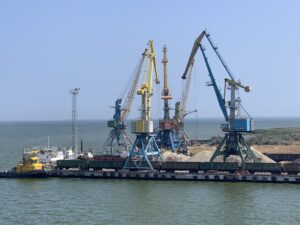
Ukraine is creating the most favorable investment climate possible to encourage potential investors, said Taras Melnychuk, the representative of the Cabinet of Ministers in the Verkhovna Rada.
“Today we have met with representatives of some of the largest American companies willing to invest in Ukraine or already doing business here. In turn, Ukraine is creating the most favorable investment climate to encourage potential investors,” he wrote on his Telegram channel.
Melnychuk noted that the Ukrainian economy needs to attract American investment to recover and grow.
According to him, special attention is paid to developing cooperation with American arms and ammunition manufacturers.
“The main prerequisite for this is to provide Ukraine with additional air defense systems. This will help protect our entire civilian infrastructure from Russian terrorism,” the Cabinet representative emphasized.
In addition, Ukraine is also interested in developing logistics routes and the energy sector.
As previously reported, Prime Minister of Ukraine Denys Shmyhal and U.S. Special Representative for Ukraine’s Economic Recovery Penny Pritzker met with American businesses.

PJSC Ukrnafta is launching a revitalization program and invites investors to participate in the restoration of the first 20 wells.
“An important part of the company’s strategy to increase production is the restoration of already drilled but abandoned wells that have prospects through the use of modern technologies,” the company said in a press release, citing Ukrnafta CEO Serhiy Koretsky.
Currently, 4222 such wells have been identified, of which 2100 are within Ukrnafta’s special permits, 700 of which are within the reserve contours.
“The company has selected 30 wells out of these 700 for the pilot. 10 will be restored on our own, and a tender is announced for 20. The company invites partners to help restore production at these sites by drilling horizontal sidetracks,” the document explains.
The company offers a deal based on the Risk Service Agreement, under which the investor must pass compliance and get access to the Virtual Data Room with information about the well.
“Ukrnafta, for its part, together with specialists, is forming a pool of wells, from three to 12, which will be restored by drilling at the expense of partners. The cost of restoring production from the wells is determined by bidding in the Prozorro system.
Subsequently, Ukrnafta receives an additional resource and pays for the revitalization using the funds from production from the restored wells. The partners, for their part, receive a share of the additional production from the revitalized wells.
“Any Ukrainian and international company that passes the compliance procedure can join,” the company said.
As reported, in 2023 Ukrnafta increased oil and condensate production by 3% (by 39.9 thousand tons) compared to 2022 – up to 1 million 409.9 thousand tons, gas production by 5.8% (by 60.4 million cubic meters), up to 1 billion 97.4 million cubic meters.
The company’s strategic goal is to double oil and natural gas production to 3 million tons and 2 billion cubic meters by 2027, respectively.
“Ukrnafta is the largest oil company in Ukraine and operates a national network of 537 filling stations, of which 456 are in operation. The company is implementing a comprehensive program to restore operations and update the format of its filling stations. Since February 2023, Ukrnafta has been issuing its own fuel coupons and NAFTAKarta cards, which are sold to legal entities and individuals through Ukrnafta-Postach LLC.
Ukrnafta’s largest shareholder is Naftogaz of Ukraine with a 50%+1 share. On November 5, 2022, the Supreme Commander-in-Chief of the Armed Forces of Ukraine decided to transfer to the state a share of corporate rights of the company owned by private owners, which is now managed by the Ministry of Defense.

The state intends to attract private investors to lend to projects for the repair, modernization, reconstruction, and construction of strategic port infrastructure facilities in Ukraine with the possibility of compensation for the funds spent through port dues.
The relevant provisions are contained in the draft resolution of the Cabinet of Ministers “Some issues of compensation for investments made by business entities in strategic port infrastructure facilities that are state-owned”, the text of which is posted on the website of the Ministry of Community Development, Territories and Infrastructure (Ministry of Health) for discussion.
The document provides for the approval of the procedure and conditions for concluding agreements on the basis of which investments made by business entities in strategic port infrastructure facilities are compensated, as well as amendments to the Cabinet of Ministers Resolution No. 899 of October 3, 2012, according to which public sector entities may make expenditures on capital investments, in particular on port infrastructure facilities, in the absence of an approved financial plan.
It is noted that the amount of investment compensation should not exceed the amount of funds actually paid by the investor to finance the design or construction of port infrastructure facilities.
In addition, it is noted that the investor may be a legal entity or an individual entrepreneur. There may be several investors at one facility.
At the same time, the new procedure will not apply to legal relations involving business entities that make private investments in port infrastructure facilities on the basis of agreements concluded under public-private partnerships, including concession agreements and lease agreements for state property.
The Ministry of Reconstruction expects that the adoption of this resolution will help restore strategic port infrastructure facilities, accelerate the growth of maritime transport, improve the competitiveness of seaports and increase their investment attractiveness.
“Due to the military aggression of the Russian Federation against Ukraine, there is a problem of insufficient funding for the maritime industry, in particular due to imperfect fiscal policy, which leads to a lack of funds at the state-owned enterprise Ukrainian Sea Ports Authority (USPA),” the explanatory note to the draft resolution says.
It is noted that the USPA has entered into contracts for a number of construction projects, but “due to lack of funds and the state’s dividend policy, it is not possible to implement even part of these projects.”
At the same time, the USPA is facing an acute issue of the need to reconstruct and maintain port infrastructure, including berthing facilities. As of February 24, 2022, the state-owned enterprise had 265 berths (cargo, auxiliary, passenger) located in 13 seaports of Ukraine. Of this number, 20 are unsuitable for normal operation, 37 require significant investment in the next five years, and more than 50 operate with low economic efficiency – they need to be restored through overhaul or reconstruction.
In addition, it is indicated that, according to preliminary calculations, in the period before the full-scale invasion, the need for USPA to finance projects for the reconstruction, modernization and construction of berths alone (more than 48 projects, of which 36 are for reconstruction and modernization) was estimated at UAH 12 billion over four years.

Foreign investors are looking for transparency, openness and willingness to cooperate in companies. This helps build trust and break down myths about corruption and instability.
This was stated by Marina Cheban, Head of the Legal Department of DIM Group, in an article for thepage.ua.
“While diplomats and politicians are discussing government investments, businesses should actively explore opportunities for existence and development in the new environment. An important aspect of successfully attracting investment from foreign companies is establishing partnerships with foreign investors. Foreign investors are looking for transparency, openness and willingness to cooperate in companies. This helps to build trust and break myths about corruption and instability,” she emphasizes.
Maryna Cheban shared an example of a successful partnership with a foreign investor company and attracting investment in the LUCKY LAND residential complex, which is notable for its scale and comprehensive social facilities. Foreign investors are interested not only in profit, but also in social issues and meeting the needs of the population. In particular, this applies to residents who migrated due to the war. The social aspect, along with well-thought-out planning and various services, creates a comfortable living environment, which makes the complex liquid and extends the product’s life cycle.
“At the moment, we cannot disclose the name of our partner and the size of the investment, but we can say with certainty that foreign investors are looking for long-term investments that bring passive income in the future, which means millions of dollars for construction and an example for other investors that the Ukrainian real estate market is potentially interesting to invest in. For the Ukrainian market, the cases of cross-border partnerships are an opportunity to share experiences, bring best practices, as well as a strategic opportunity to develop and create a positive image for the cumulative effect of building the Ukrainian real estate and development market,” Cheban said.
However, according to Cheban, attracting foreign investors to Ukrainian residential projects is not an easy task, and risk management plays an important role. An important step is project due diligence, which allows investors to understand all aspects of Ukrainian legislation, urban planning regulations, and other norms. Risk management includes a detailed analysis of risks that may arise, including military, political, tax, and economic factors. It is important for Ukrainian companies to demonstrate openness, trust and a deep understanding of the risks involved in attracting foreign investment. This is an important step for Ukraine’s development and building a safe investment environment.
DIM Group was founded in 2014 and consists of six companies covering all stages of construction. To date, it has commissioned 12 buildings in six residential complexes with a total residential area of over 218 thousand square meters. Six residential complexes of “comfort+” and “business class” categories are under construction: “New Autograph, Metropolis, Park Lake City, Lucky Land, etc.

Investors have withdrawn $70 billion from developing country bond funds since the beginning of 2022, according to an analysis by JPMorgan Chase & Co. based on data from EPFR Global.
This is the largest capital outflow since JPMorgan began tracking this data in 2005.
Last week alone, net outflows from emerging markets bond funds amounted to $4.2 billion.
The growth of interest rates in developed countries increases the attractiveness of their assets and reduces interest in less reliable securities of emerging markets, writes the Financial Times newspaper. At the same time, the strengthening of the US currency increases the cost of developing countries to service the dollar debt.
In September, JPMorgan raised its 2022 emerging market bond fund outflow forecast to $80 billion from $55 billion, and the bank’s emerging markets analyst Milo Gunasinghe notes that investor capital outflows are unabated so far.

More and more investors are pessimistic about the prospects for the global economy and corporate profits, according to the results of a monthly survey of fund managers conducted by Bank of America Corp. (BofA).
According to the results of the July survey, the proportion of respondents who expect the economy to weaken in the next 12 months reached a record 79%, an increase of 6 percentage points (p.p.). The share of investors expecting corporate earnings to worsen over the next 12 months rose by 7 percentage points, also reaching 79%.
Stagflation in the global economy is expected by a record 90% of respondents compared to 83% a month earlier.
The survey, which included 259 investors managing $722 billion in assets, was conducted by BofA last week.
Investors have reduced exposure to risky assets to lows not seen even during the global financial crisis, “completely capitulating” in the face of a bleak economic outlook, BofA said.
The share of stocks in investment portfolios this month fell to the lowest since the collapse of investment bank Lehman Brothers in 2008, the share of cash balances reached 6.1%, the highest since October 2001.
Among the biggest risks, fund managers point to high inflation, a global recession, and a hawkish central bank.
At the same time, the proportion of respondents who expect inflation to slow down next year has reached its highest level since the global financial crisis.
BofA has been conducting surveys of fund managers since 1994.